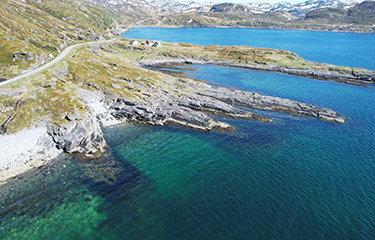Oslo, Norway-based Cermaq has signed a contract with AKVA Group worth at least EUR 60 million (USD 64 million) to build a land-based post-smolt facility in Hasvik, Sørøya, Norway in the northern region of Finnmark.
Engineering and design work on the recirculating aquaculture system (RAS) facility, which will have a production capacity of 12 million smolt annually, “will start immediately,” according to AKVA CEO Knut Nesse.
“This contract with Cermaq Norway represents for AKVA the largest contract in Norway ever, and will support the activity level in our land-based business for the next few years,” he said in a 6 June press release.
The facility will be completed and production will begin in 2026, according to Cermaq Project Manager Snorre Jonassen.
"We are now starting the design of the plant and will start groundwork within a short time to prepare the site before winter. This is the first smolt plant Cermaq is building in Western Finnmark, and will create 24 new jobs in Hasvik municipality. It will strengthen our business in the region and contribute to more activity in Hasvik municipality,” Jonassen said.
Many of the world’s largest salmon farming companies have turned to post-smolt production and grow-out of larger smolts before their placement in sea cages as a method of achieving faster harvest times and fewer mortalities. Jonassen said construction of the facility will be crucial to the company’s hopes to reduce the time its fish are in sea cages before they reach slaughter weight.
"Larger hatchery fish is good for both fish health and fish welfare because it becomes significantly more resistant. In addition, it will manage with one winter in the sea instead of two. This means fewer dewormings and less stress, which will be very positive for fish health,” Jonassen said.
Ellekjær said Cermaq plans to incorporate state-of-the-art biosecurity and fish welfare, as well as energy efficiency measures, into the Hasvik facility, Jonassen said.
Cermaq had planned to advance the Hasvik project sooner, but the company’s concern over Norway’s proposed salmon aquaculture tax stalled that plan. In May, the Norwegian government reached a consensus on a 25 percent tax after eight months of deliberation, and that decision has forced Cermaq to scale down the facility, according to Cermaq Norway CEO Knut Ellekjær
"Given our need for smolt, it is crucial to increase our own smolt production, regardless of the tax regime. At the same time, we have scaled back the project because the framework conditions going forward are uncertain as we experience it,” Ellekjær said.
The company would have liked to build an even larger facility, but that effort was forestalled by the salmon tax, Ellekjær said.
"The uncertainty surrounding the effect of the chosen tax model and tax level will affect the level of investment, particularly related to growth. The supply of smolt for existing production is, however, a significant bottleneck for current operations,” he said. “When the land plant is completed, we will be able to cover today's need for smolt, but that does not take into account any increase in production.”
Photo courtesy of Cermaq







